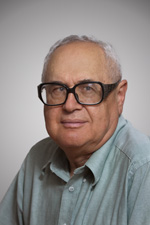Prof. R. Benny Gerber

Profesor of Chemistry; Professor of Theoretical and Physical Chemistry and Fiedler Chair in Chemistry, Hebrew University of Jerusalem, Israel [Ph.D. from University of Oxford, England]. Professor Gerber brings expertise in the quantum chemical simulation of atmospherically relevant systems to the ORU.
Prof. Gerber’s research interests include the dynamics of molecular processes in clusters, in the solid state and at surfaces, vibrational spectroscopy and potential energy functions biological molecules, quantum simulation methods for spectroscopy and dynamics of many-atom systems, and chemical processes of atmospheric importance.
Splitting his time between teaching and research posts at UCI and The Hebrew University of Jerusalem, a major focus of Dr. Gerber’s research is chemical reaction dynamics at very low temperatures, dynamics calculations incorporating quantum effects at low temperatures, and the combination of electron structure methods with dynamics of chemical reactions. He carries out theoretical calculations to test reaction mechanisms proposed by the experimentalists in AirUCI. Vibrational spectroscopy is among the main tools of physical chemistry in the exploration of molecular properties. Interpretation of the experiments requires theoretical calculations of the spectra, and for large molecules this is a formidable challenge. It implies calculations of the wave functions and energy levels of many interacting vibrational degrees of freedom. An algorithm developed by the group in recent years, the Vibrational Self-Consistent Field (VSCF) method led to major progress on this problem, and has emerged as a leading tool in this field.
Comparison with experiments, using this computational method, has already led to the unraveling of properties of biological molecules, large hydrogen-bonded clusters and molecules and complexes of atmospheric importance. The VSCF algorithms developed by the Gerber group are extensively used also by other theoretical and experimental groups.
A recent direction of the Gerber group includes methods that combine electronic structure methods with the dynamics of chemical reaction processes. Very interesting results were recently obtained on the mechanisms and rates of several atmospherically important reactions, including proton transfer and recombination with anions, and ionization of NOx molecules in water. Another major direction of the Gerber group is to use theoretical calculations to explore, and sometimes predict, novel types of molecules. One area of major impact has been noble gas chemistry. A completely new chemical family of noble gas molecules involving noble gas atoms was predicted theoretically in this work, prepared experimentally by groups in Finland and Russia, with a major ongoing effect on the field.

